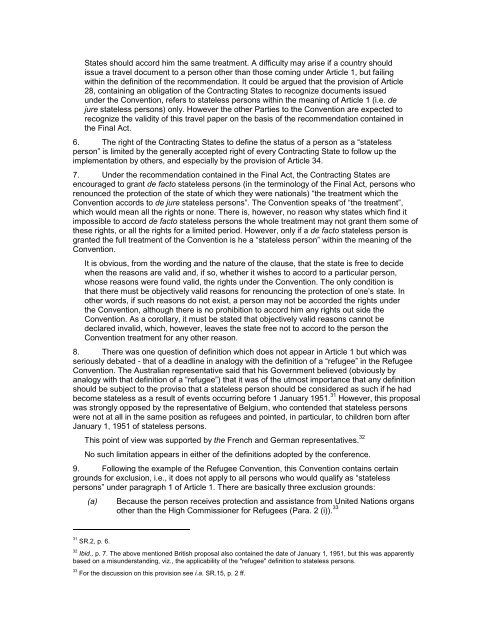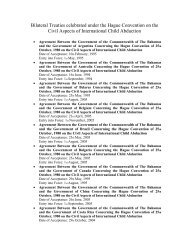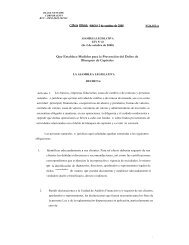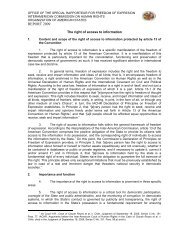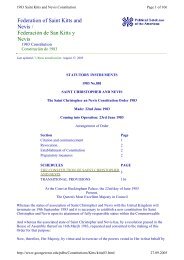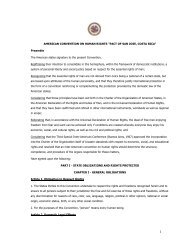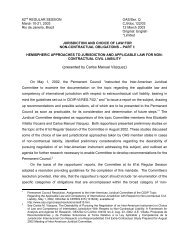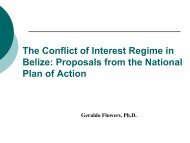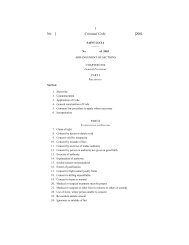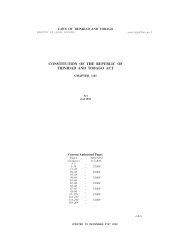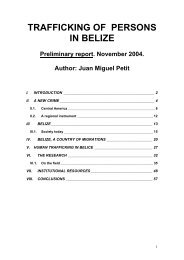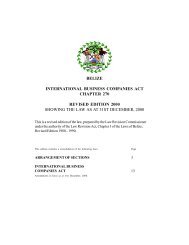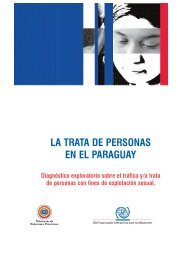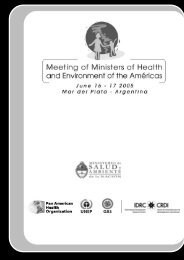CONVENTION RELATING TO THE STATUS OF ... - Refworld
CONVENTION RELATING TO THE STATUS OF ... - Refworld
CONVENTION RELATING TO THE STATUS OF ... - Refworld
You also want an ePaper? Increase the reach of your titles
YUMPU automatically turns print PDFs into web optimized ePapers that Google loves.
States should accord him the same treatment. A difficulty may arise if a country should<br />
issue a travel document to a person other than those coming under Article 1, but failing<br />
within the definition of the recommendation. It could be argued that the provision of Article<br />
28, containing an obligation of the Contracting States to recognize documents issued<br />
under the Convention, refers to stateless persons within the meaning of Article 1 (i.e. de<br />
jure stateless persons) only. However the other Parties to the Convention are expected to<br />
recognize the validity of this travel paper on the basis of the recommendation contained in<br />
the Final Act.<br />
6. The right of the Contracting States to define the status of a person as a “stateless<br />
person” is limited by the generally accepted right of every Contracting State to follow up the<br />
implementation by others, and especially by the provision of Article 34.<br />
7. Under the recommendation contained in the Final Act, the Contracting States are<br />
encouraged to grant de facto stateless persons (in the terminology of the Final Act, persons who<br />
renounced the protection of the state of which they were nationals) “the treatment which the<br />
Convention accords to de jure stateless persons”. The Convention speaks of “the treatment”,<br />
which would mean all the rights or none. There is, however, no reason why states which find it<br />
impossible to accord de facto stateless persons the whole treatment may not grant them some of<br />
these rights, or all the rights for a limited period. However, only if a de facto stateless person is<br />
granted the full treatment of the Convention is he a “stateless person” within the meaning of the<br />
Convention.<br />
It is obvious, from the wording and the nature of the clause, that the state is free to decide<br />
when the reasons are valid and, if so, whether it wishes to accord to a particular person,<br />
whose reasons were found valid, the rights under the Convention. The only condition is<br />
that there must be objectively valid reasons for renouncing the protection of one’s state. In<br />
other words, if such reasons do not exist, a person may not be accorded the rights under<br />
the Convention, although there is no prohibition to accord him any rights out side the<br />
Convention. As a corollary, it must be stated that objectively valid reasons cannot be<br />
declared invalid, which, however, leaves the state free not to accord to the person the<br />
Convention treatment for any other reason.<br />
8. There was one question of definition which does not appear in Article 1 but which was<br />
seriously debated - that of a deadline in analogy with the definition of a “refugee” in the Refugee<br />
Convention. The Australian representative said that his Government believed (obviously by<br />
analogy with that definition of a “refugee”) that it was of the utmost importance that any definition<br />
should be subject to the proviso that a stateless person should be considered as such if he had<br />
become stateless as a result of events occurring before 1 January 1951. 31 However, this proposal<br />
was strongly opposed by the representative of Belgium, who contended that stateless persons<br />
were not at all in the same position as refugees and pointed, in particular, to children born after<br />
January 1, 1951 of stateless persons.<br />
This point of view was supported by the French and German representatives. 32<br />
No such limitation appears in either of the definitions adopted by the conference.<br />
9. Following the example of the Refugee Convention, this Convention contains certain<br />
grounds for exclusion, i.e., it does not apply to all persons who would qualify as “stateless<br />
persons” under paragraph 1 of Article 1. There are basically three exclusion grounds:<br />
(a)<br />
Because the person receives protection and assistance from United Nations organs<br />
other than the High Commissioner for Refugees (Para. 2 (i)). 33<br />
31 SR.2, p. 6.<br />
32 Ibid., p. 7. The above mentioned British proposal also contained the date of January 1, 1951, but this was apparently<br />
based on a misunderstanding, viz., the applicability of the "refugee" definition to stateless persons.<br />
33 For the discussion on this provision see i.a. SR.15, p. 2 ff.


